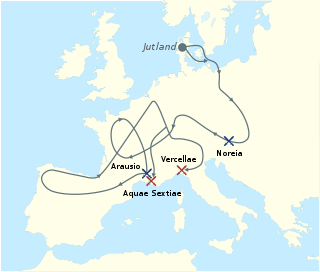Related Research Articles
Year 43 BC was either a common year starting on Sunday, Monday or Tuesday or a leap year starting on Sunday or Monday of the Julian calendar and a common year starting on Monday of the Proleptic Julian calendar. At the time, it was known as the Year of the Consulship of Pansa and Hirtius. The denomination 43 BC for this year has been used since the early medieval period, when the Anno Domini calendar era became the prevalent method in Europe for naming years.
Marcus Popillius Laenas was a four-time consul of the Roman Republic. In the year 359 BC, he defeated a Gallic army.

Gaius Popillius Laenas was a politician and general of the Roman Republic. He was consul two times, once in 172 and once in 158 BC.

Acqui Terme is a city and comune in the province of Alessandria, Piedmont, northern Italy. It is about 35 kilometres (22 mi) south-southwest of Alessandria. It is one of the principal winemaking communes of the Italian DOCG wine Brachetto d'Acqui.

The Via Popilia is the name of two different ancient Roman roads begun in the consulship of Publius Popilius Laenas. One was in southern Italy and the other was in north-eastern Italy.
Publius Popillius Laenas was consul in 132 BC, and builder of the Via Popilia.
The gens Popillia, sometimes written Popilia, was a plebeian family in Rome. The first of the Popillii to obtain the consulship was Marcus Popillius Laenas in 359 BC, only eight years after the lex Licinia Sextia opened that magistracy to the plebeians.
Marcus Popillius Laenas was a Roman statesman.
The gens Octavia was a plebeian family at ancient Rome, which was raised to patrician status by Caesar during the first century BC. The first member of the gens to achieve prominence was Gnaeus Octavius Rufus, quaestor circa 230 BC. Over the following two centuries, the Octavii held many of the highest offices of the state; but the most celebrated of the family was Gaius Octavius, the grandnephew and adopted son of Caesar, who was proclaimed Augustus by the senate in 27 BC.
The Statielli, Statiellātes, or Statiellenses were members of a small Ligurian tribe that inhabited an area south of the river Padus. Their chief town was Aquae Statiellae, on the road from Vada Sabatia, near Savona to Dertona (Tortona) and Placentia. The Statielli settled in the territory bordered to the west and north by the course of the Tanaro river, to the east by the Orba, and to the south by the Alpine-Apennine Ligurian watershed, an area now included between the current provinces of Alessandria, Savona, Asti and Cuneo.
Forum Popilii is a Catholic titular see. The current Titular Bishop of Forum Popilii is Robert Joseph Fisher.
Quintus Pompeius was the name of various Romans from the gens Pompeia, who were of plebeian status. They lived during the Roman Republic and Roman Empire.
Marcus Sergius or Servius Octavius Laenas Pontianus was a Roman politician of the early second century. He served as consul in AD 131, alongside Marcus Antonius Rufinus, during the reign of Hadrian.
This section of the timeline of Hispania concerns Spanish and Portuguese history events from the Carthaginian conquests to before the barbarian invasions.

The Battle of Burdigala took place during the Cimbrian War in 107 BC. The battle was fought between a combined Germanic-Celtic army including the Helvetian Tigurini under the command of Divico, and the forces of the Roman Republic under the command of Lucius Cassius Longinus, Lucius Caesoninus, and Gaius Popillius Laenas. Longinus and Caesoninus were killed in the action and the battle resulted in a victory for the combined tribes.
Marcus Pedo Vergilianus was consul at the beginning of AD 115, during the reign of Trajan. He died in an earthquake toward the end of that year. His true family name is uncertain, his gens being omitted from surviving versions of his name.
Gaius Octavius Laenas was a Roman senator, who was active during the Principate. He was suffect consul in the second half of AD 33 as the colleague of Lucius Salvius Otho. Laenas was also curator aquarum, or overseer of the aqueducts and water supply of Rome from the death of Marcus Cocceius Nerva from about the year 33 to the year 38.
Marcus Popilius Laenas is the name of two Roman consuls
Gaius Licinius Crassus was a Roman politician in the second century BC.